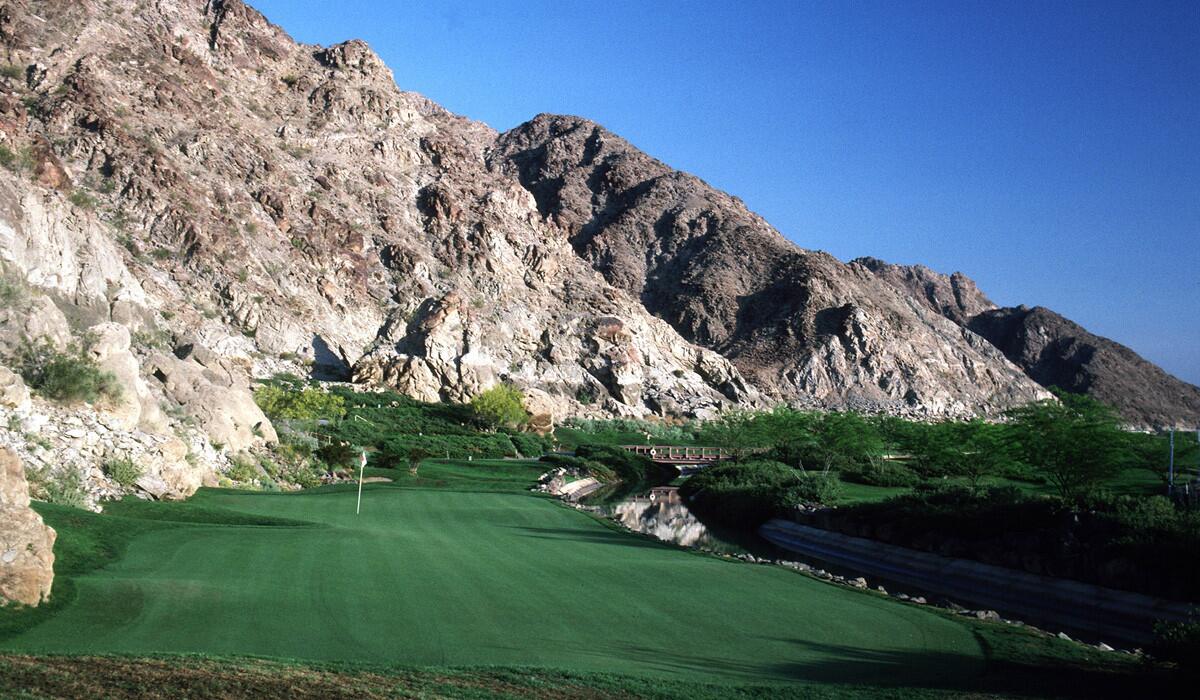Bill Dwyre: No Hope, but there’s still golf in the desert

A view of the 17th hole on the PGA West Palmer Golf Course in Palm Springs.
- Share via
The Bob Hope Desert Classic no longer exists. Nor does the Humana Challenge.
But come January, there will be a pro golf tournament in the Palm Springs desert, same as there has been since 1960. That’s when they called their event the Palm Springs Desert Golf Classic, Arnold Palmer won it and the $12,000 first prize, and tournament directors had to write personal checks to cover a $65,000 event shortfall.
This January’s event will be the CareerBuilder Challenge. New name. New dot-com money. And a new infusion of reality into an event that, for a while, was happily among the last holdouts in the category of mom-and-pop run with the big guys.
That changed four years ago, when Humana, the giant health insurer, was recruited as a title sponsor, in partnership with former president Bill Clinton’s foundation.
The Desert Classic, by whatever name, was struggling then. Its format — pros playing five days and 90 holes with amateurs — was keeping the big-name players away. For example, Tiger Woods has never played in the event.
The $12,000 fee per amateur, and there were 384 of them, had become less important than the missing big-name players.
So it was time to hold them or fold them, and the tournament operating Desert Classic Charities, to its credit, decided to play on. Their reasoning was solid, and remains so today. Better to have some tournament than none at all. None at all leaves dozens of Coachella Valley charities now dependent on them out in the cold.
Humana and Clinton came. The tournament stopped teetering, went down to 72 holes, and has mostly thrived. Now Humana, which has replaced its chief executive/golf nut with a non-golfer and has had plenty of time to cement a relationship with Clinton, has bowed out four years before its original commitment, paying the tournament a buyout fee.
That meant it was time for Tim Finchem to again come to the rescue. Finchem is PGA Tour commissioner. To say he is corporate is to say the sun sets in the west. One of these days, we may see golfers competing in three-piece suits. The NBA has Jerry West as its logo. The PGA Tour ought to have Finchem.
Just as he had brokered the Humana/Clinton deal, Finchem delivered this new dot.com money. He should be commended. Desert Classic Charities, and its president and chief executive, John Foster, do exactly that at every turn. Charities such as the Boys and Girls Club of Cathedral City and the Guide Dogs of the Desert continue to get checks. And a few years ago, that was no certainty.
But with every new brigade of bulldozers making room for another Wal-Mart, Mom and Pop’s Diner gets trampled. So do their traditions and history. No bad guys here. Progress and change just brings debris.
But amid the noise of the bulldozers, history still needs to have its place and lessons recognized.
The tournament’s charitable element began basically with the addition of Hope’s name. The world famous comedian lent his name and fame to the event basically because one of his good friends, former president Dwight Eisenhower, was playing golf with a friend at Thunderbird Country Club and the friend collapsed on the course.
This was in the early 1960s and there was one hospital in the area, in downtown Palm Springs. The ambulance couldn’t get Ike’s friend to the hospital in time and he died.
The Hopes and the Eisenhowers discussed this, and the Hopes donated 80 acres of land for a hospital to be built. It was named the Eisenhower Medical Center, and was dedicated in 1971, two years after its namesake died. It remains there today, in Rancho Mirage, greatly expanded and serving much more than the central area of the Coachella Valley. The main entrance is, of course, off Bob Hope Drive.
Like Hope, Eisenhower was an avid golfer. He probably listed that third on his resume: 1. President of the United States; 2. Five-star general; 3. Golfer.
A main centerpiece of the lobby at the Eisenhower Medical Center is a huge painting of Ike, holding his reading glasses in his right hand. At Eldorado Country Club, where they once gave Eisenhower a home on the 11th fairway, there is a duplicate of that painting, except that, at Eldorado, Ike is holding a golf scorecard in his right hand.
For a long time, as Hope wanted, the Eisenhower Medical Center was the main financial recipient of the Bob Hope Desert Classic. It stayed that way when it became the Bob Hope Chrysler Classic.
The hospital can hardly complain too loudly if, indeed, its piece of the pie has dwindled since Humana and the Clinton Foundation came to town. Since Hope put his name on the tournament in 1965, the Eisenhower Medical Center has received $34.7 million from it.
In 2013, it received zero. Last year, it received $225,000. This year’s allotment is scheduled for November, with no guarantees.
Foster says that, in the beginning, “Eisenhower was a pleasant little hospital and we were fairly vital.” He also says, “We have not been as successful as we want to be in recent years, raising money for the hospital.”
The numbers are interesting. Amateur slots for the tournament are down to 156. Foster says the reduction from past amateur revenue is about $1 million. The Clinton Foundation has an annual guarantee of $1 million, confirmed by Foster. The current annual shortfall of the Eisenhower Medical Center from the golf event is $1 million.
Foster says Bill Clinton’s presence has pumped life into the tournament, and that the pre-tournament wellness seminar his foundation runs is a great boost to the area.
No argument there. Really, no bad guys to be found anywhere.
Only a wish that history teaches what it always has. Not to forget it.
Twitter: @DwyreLATimes
More to Read
Go beyond the scoreboard
Get the latest on L.A.'s teams in the daily Sports Report newsletter.
You may occasionally receive promotional content from the Los Angeles Times.










